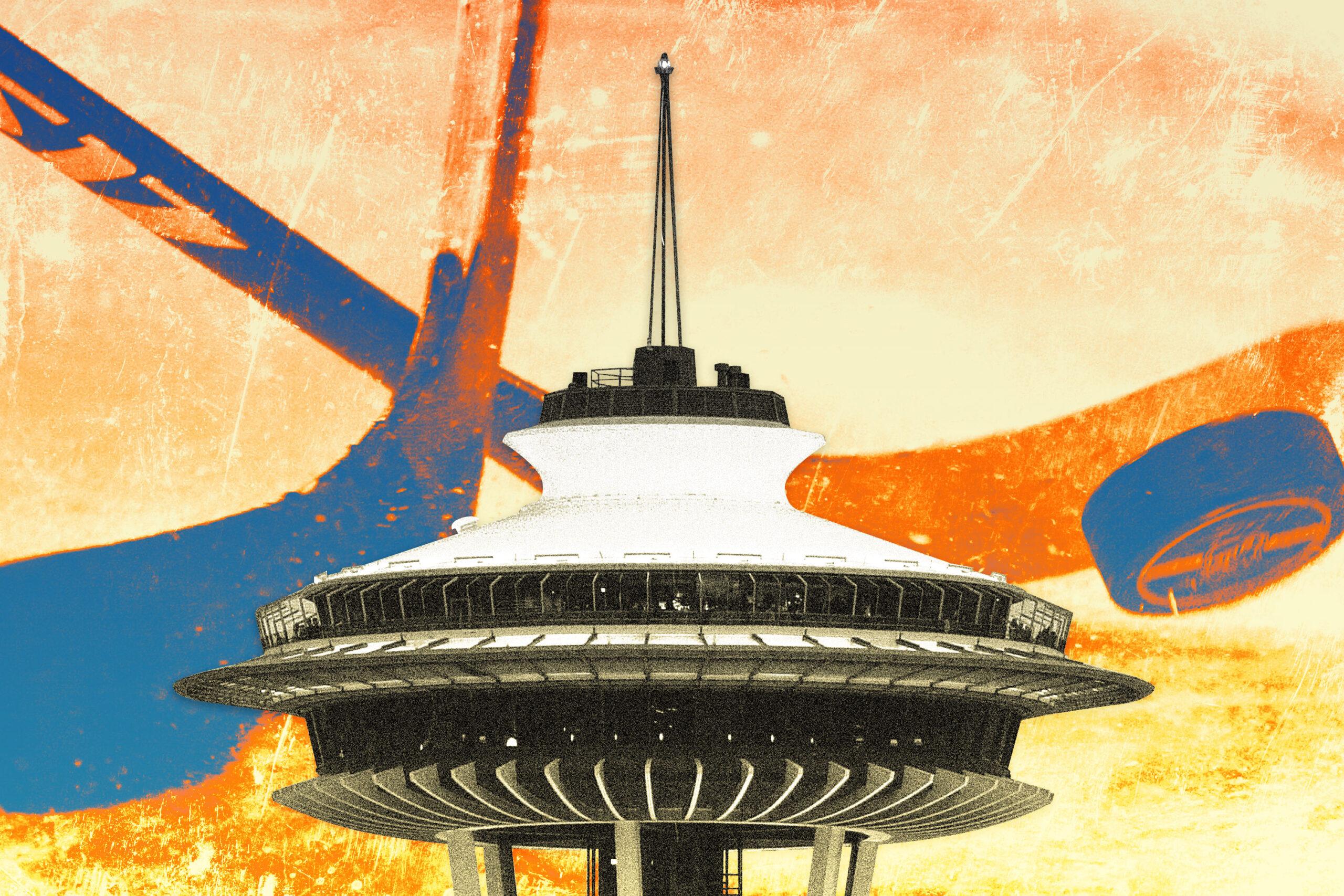
Hockey fans, start preparing your best bad material about flannel shirts, fishmongers, coffee shops, and a crippling lack of affordable housing! At this week’s NHL Board of Governors conference—held in the extremely hockey-adjacent setting of … Sea Island, Georgia?—the league’s powers that be finally approved an expansion idea that has been in the works for what feels like forever: a new NHL team in Seattle.
An ownership group that includes explosion-enthusiast Jerry Bruckheimer, private equity kingpin (and shoulda-kept-your-mouth-shut erstwhile Uber board member) David Bonderman, and longtime roving sports executive Tim Leiweke will reportedly pay close to $1.5 billion to renovate KeyArena—home to the late, great Seattle SuperSonics—and cover NHL expansion costs for a franchise that has already taken deposits on 33,000 season tickets. The Seattle team will be part of the NHL’s Pacific Division by the 2021-22 season. To accommodate this new addition, the league will be tinkering with its alignment: The Arizona Coyotes are moving to the Central Division, and all four NHL divisions will have an even eight teams by 2021.
“It’s been a lifelong dream of mine to be a part of this,” Bruckheimer said at a press conference on Tuesday, shortly before NHL commissioner Gary Bettman was presented with a no. 32 jersey to commemorate what will be the NHL’s 32nd team. The jersey was unbranded because no one knows what the Seattle franchise will be called yet, although Bovada has betting odds on it (Totems is currently the front-runner at -105 with Emeralds, Rainiers, Sockeyes, and Kraken following closely behind), and forensic web domain registration analysis has already begun. (A personal note: PLEASE let “Seattle Sasquatch” be real and not sprung from the mind of some young edgelord!!!)
Bruckheimer’s statement was less about bringing an NHL team to Seattle specifically (he doesn’t have much of a personal tie to the city) as it was about owning a team in general—he’s been involved in previous efforts to start franchises in Las Vegas and buy others in Anaheim and Pittsburgh. Nonetheless, he’s now a part of a regional effort that has persisted, in various forms, for quite some time. The league first contemplated expanding to cities like Kansas City, Winnipeg, Las Vegas, and Seattle more than a decade ago, in late 2007. (Seattle businessman Jeff Bezos may hold a monopoly on your life’s consumption, but he wasn’t the first to rile up myriad municipalities with the promise of a new operational locus.) By last season, two of those places—Winnipeg and Las Vegas—boasted real, live teams that were legit enough to meet head-to-head in the Western Conference finals.
But even though the Seattle franchise will be a newcomer to the league, the city’s history with hockey started over a century ago. In 1917, a few months before the inception of the modern National Hockey League, the Seattle Metropolitans of the Pacific Coast Hockey Association defeated the Montreal Canadiens of the National Hockey Association in four games to win the Stanley Cup, becoming the first American team to hoist the trophy. (You know future Seattle fans are going to needle their regional rival, the Vancouver Canucks, by reminding them which city put its name on the Cup most recently.) That erstwhile Seattle franchise may have folded in 1924, but big league hockey will be back in the city in 2021.
That planned start date is noteworthy for a couple of reasons. Seattle’s ownership group had initially lobbied to play the franchise’s first season in 2020, but the league preferred to wait a year. The mostly unspoken rationale is that because players and owners can opt out of the NHL’s current collective bargaining agreement next September (which could lead to a lockout ahead of the 2020-21 season), it would have been unnecessarily risky to launch a franchise in an uncertain labor environment. (The $650 million Seattle expansion fee, per the current CBA, is not considered part of the “hockey-related revenue” that is split with players and will be divided up between all NHL teams with the exception of the second-year Vegas Golden Knights, who will also be exempt from Seattle’s expansion draft.)
But the other reason is that it’s just safer to wait, given all the necessary renovations to KeyArena. The mostly subterranean building, opened in 1962 and featuring an architecturally iconic four-cornered roof, was originally designed for basketball—the building was home to the SuperSonics until 2008, when they loudly and controversially decamped to Oklahoma City. A number of previous professional sports bids in Seattle, like the NHL proposal fronted by hedge fund manager Chris Hansen earlier this year, sought to build a whole new venue, to their peril: “In Las Vegas, there’s steel coming out of the ground,” Bettman said in 2015, explaining why that city was a front-runner for an NHL team over other wannabes. Under the approved plan, KeyArena will be renamed Seattle Center Arena and will be almost completely gutted and reimagined by Oak View Group, Leiweke’s company.
Leiweke has a history in sports: He was previously the CEO of conglomerates who ran a number of Los Angeles and Toronto franchises, and he also tried to bring an NHL team to Kansas City (that venture failed despite the construction of the Sprint Center in 2007). Lewiweke’s brother, Tod, will serve as the Seattle franchise’s president and CEO. Tod was previously a team executive for franchises and leagues ranging from the Portland Trail Blazers to the Tampa Bay Lightning to the National Football League.
Tod Leiweke is well aware of how successful the league’s most recent expansion team—the Vegas Golden Knights—was in building their franchise. You may remember that the Knights half-charmed, half-embarrassed the hockey world earlier this year when they made it to the Cup Final in their very first season. (It had taken previous NHL expansion teams an average of 12 years to get that far.) They lost to the Washington Capitals in five games, but their success shocked the league and led to many protestations that the aggressive expansion draft rules the Golden Knights were given (and rules that they used remarkably to their advantage) were unfair.
Despite those gripes, the rules will remain gloriously unchanged for the Seattle franchise. Dave Tippett, a senior adviser to the franchise, has said that he already has a list of candidates to fill the most important lynchpin positions of any expansion process—the coach and GM—and that many of those on his list are currently employed on other NHL organizations. But that hasn’t stopped folks from speculating that, based on Leiweke’s time working with the Lightning, one of those people might be Steve Yzerman, who recently stepped down from the GM role in Tampa Bay.
It’s all years away, but as the Golden Knights can attest, life comes at you fast: One minute you’re just a gleam in the eye of a sports-branding consultant or a hedge funder with money to burn; the next minute you’re striving to create a team history and ethos from scratch and rationalizing line combinations and bridge contracts to extremely invested fans. The fervent Seattle faithful once rallied behind the concept of the “12th Man,” an idea that Leiweke helped reintroduce in 2006 and one that’s now a Seahawks staple. It won’t be long before they’re fully behind the long-awaited 32nd Team, too.

